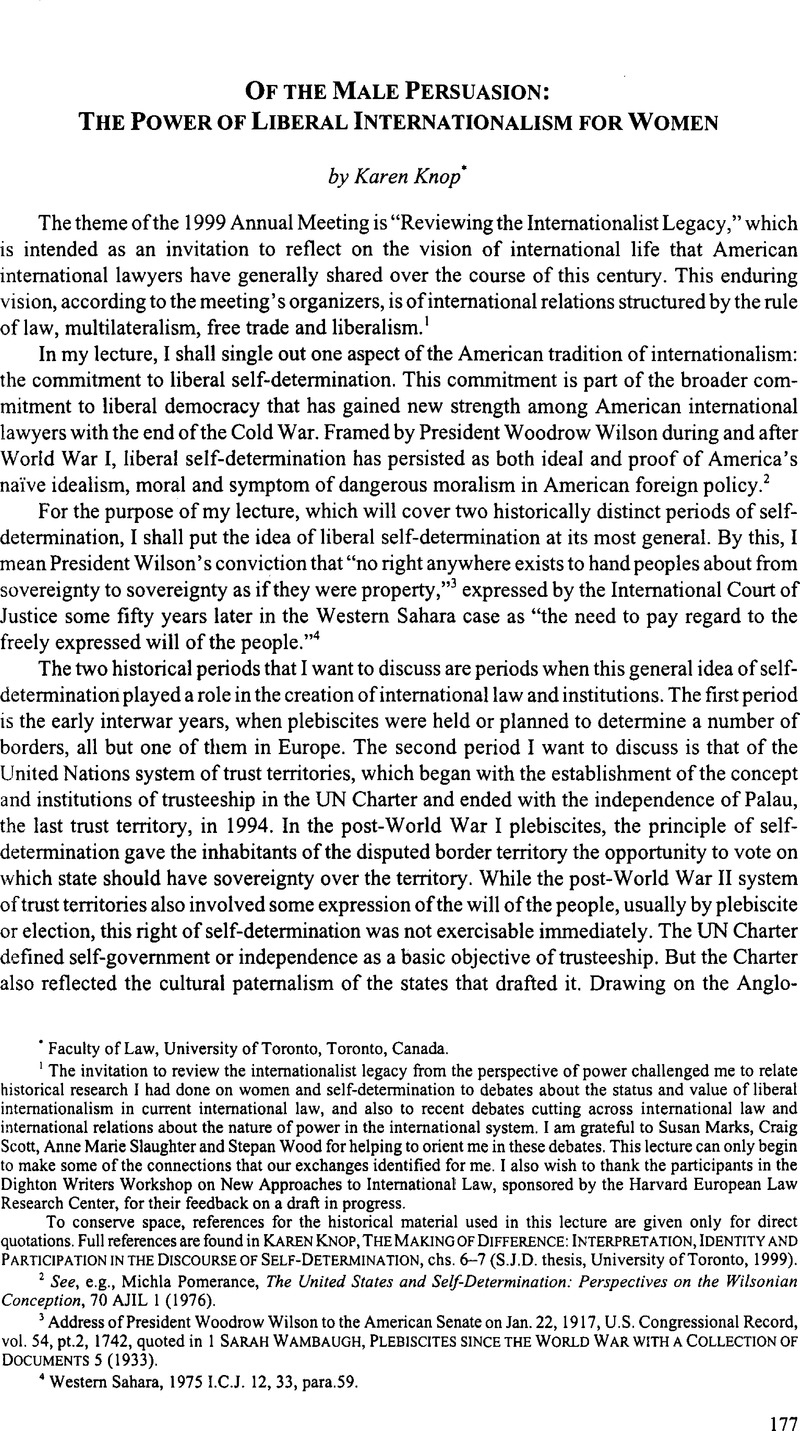Published online by Cambridge University Press: 28 February 2017

1 The invitation to review the internationalist legacy from the perspective of power challenged me to relate historical research I had done on women and self-determination to debates about the status and value of liberal internationalism in current international law, and also to recent debates cutting across international law and international relations about the nature of power in the international system. I am grateful to Susan Marks, Craig Scott, Anne Marie Slaughter and Stepán Wood for helping to orient me in these debates. This lecture can only begin to make some of the connections that our exchanges identified for me. I also wish to thank the participants in the Dighton Writers Workshop on New Approaches to International Law, sponsored by the Harvard European Law Research Center, for their feedback on a draft in progress.
To conserve space, references for the historical material used in this lecture are given only for direct quotations. Full references are found in Karen Knop, the Making of Difference: Interpretation, Identity and Participation in the Discourse of Self-Determination, chs. 6-7 (S.J.D. thesis, University of Toronto, 1999).
2 See, e.g., PomeranĎe, Michla, The United States and Self-Determination: Perspectives on the Wilsonian Conception, 70 AJIL 1 (1976)CrossRefGoogle Scholar.
3 Address of President Woodrow Wilson to the American Senate on Jan. 22,1917, U.S. Congressional Record, vol. 54, pt.2, 1742, quoted in 1 Sarah Wambaugh, Plebiscites Since the World War with a Collection of Documents 5 (1933).
4 Western Sahara, 1975 I.C.J. 12, 33, para.59.
5 Franck, Thomas M., The Emerging Right to Democratic Governance, 86 AJIL 46 (1992)CrossRefGoogle Scholar.
6 1 Wambaugh, supra note 3, at 3.
7 “Four Points” speech to Congress, Feb. 11, 1918, quoted in id. at 11.
8 Graham, Sally Hunter, Woodrow Wilson, Alice Paul, and the Woman Suffrage Movement, 98 Pol. Sci. Q. 665, 667 (1983-1984)CrossRefGoogle Scholar.
9 Id. at 676.
10 Quoted in Mary Gray Peck, Carrie Chapman Catt: A Biography 273 (1944).
11 I David Hunter Miller, My Diary At the Conference of Paris with Documents 238, n.b (n.d.)
12 Franck, supra note 5.
13 Opinion and Award of the Arbitrator in the matter of the arbitration between the Republic of Chile and the Republic of Peru, with respect to the unfulfilled provisions of the Treaty of Peace of Oct. 20, 1883, under the Protocol and Supplementary Articles signed at Washington, July 20, 1922 (1925), reprinted in 2 Wambaugh, supra note 3, 282 at 305.
14 de Auer, Paul, Plebiscites and the League of Nations Covenant, 6 Trans. Grotian Soc’y 45, 53-54 (1920)Google Scholar.
15 Jean Bethke Elshtain, Women and War (1995).
16 Franck, supra note 5, at 87-90.
17 Report of the Commission charged with the preparation of the public expression of opinion (signed at Warsaw Feb. 17, 1921, and presented to the Council of the League of Nations Feb. 24, 1921), reprinted in 2 Wambaugh, supra note 3, 273 at 279.
18 Commission on the Status of Women, Information Concerning the Status of Women in Trust Territories, 7th Sess., Un Doc. E/CN.6/210 (1953) 12.
19 Petition from the Comité féminin de I ‘Union des Populations du Cameroun concerning the Cameroons under French and under British administration (T/Pet.5/60-T/Pet.4/32), Un TCOR, 6th Sess., Annex Vol. 2, Agenda Item 5(1950)278.
20 Kennedy, David, The Move to Institutions, 8 Carduzo L. Rev. 841 (1987)Google Scholar.
21 Berman, Nathaniel, Modernism, Nationalism, and the Rhetoric of Reconstruction, 4 Yale J.L. & Hum. 351 (1992)Google Scholar.
22 Marks, Susan, The “EmergingNorm”: Conceptualizing “Democratic Governance”, 91 ASIL Proc. 372 (1997)Google Scholar; Marks, Susan, The End of History? Reflections on Some International Legal Theses, 3 Eur. J. Int’l L. 449 (1997)CrossRefGoogle Scholar. See also, e.g., Mertus, Julie, Doing Democracy “Differently”: The Transformative Potential of Human Rights NGOS in Transnational Civil Society, Third World Q. (forthcoming)Google Scholar.
23 Marks, The End of History?, supra note 20, at 450.
24 Finnemore, Martha & Sikkink, Kathryn, International Norm Dynamics and Political Change, 52 Int’l Org. 887 (1998)CrossRefGoogle Scholar.
25 Susan Marks, International Law and Democracy: A Critique of Ideology (forthcoming).